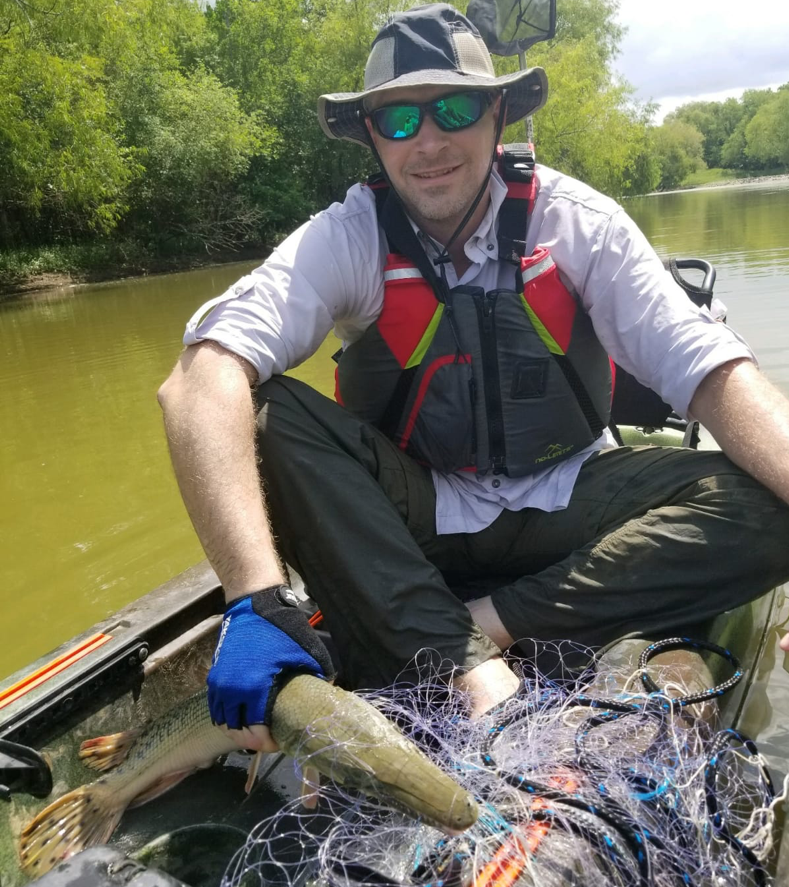|
|
|
|
 Partnering with Texas Parks and Wildlife to protect alligator gar Partnering with Texas Parks and Wildlife to protect alligator gar
Efforts to control flooding to protect people and property can have negative consequences for species that thrive in floodplains. Alligator gar, a "living fossil" that has changed little in the past 100 million years, is one such native Texas fish species of conservation concern. David Hoeinghaus, UNT associate professor of biological sciences, is collaborating with the Texas Parks and Wildlife Department to understand how floodplain connectivity affects alligator gar populations in the Trinity River. In a new multi-year project, he will work with biologists at the department and the Trinity River National Wildlife Refuge. Their research findings will have direct application for management of the refuge and other floodplain areas to benefit alligator gar.
|
|
|
|
|
|
| Innovating through prestigious NSF CAREER Award |
|
Ifana Mahbub, assistant professor of electrical engineering, has won a $500,000 NSF Early Career Development Program (CAREER) grant to develop a wireless recording, stimulation and power system that will allow medical researchers in real time to study and possibly treat brain diseases such as Parkinson’s and Alzheimer’s without bulky recorders and power sources. Mahbub is director of the Integrated Biomedical Circuits and Systems Laboratory, where, under a separate NSF grant of $370,000, she also is using the latest energy-harvesting technology, known as reverse electrowetting, to develop a wireless, wearable fitness tracker that will never need to be charged.
|
|
|
|
|
|
|
| Challenging preconceived notions about food deserts |
|
Research by UNT medical geographer Chetan Tiwari, an associate professor in the Department of Geography and the Environment, and market researcher Ed Rincón contests that low-income neighborhoods wouldn't be profitable areas for grocery stores. Tiwari and Rincón explored crime data and how low-income communities spend their money in areas of Dallas that are labeled food deserts. Their findings, which were featured in D Magazine, reveal that contrary to popular belief, these areas could be supportive to grocery stores. Spending on food does not correlate with income in the same way as spending on things such as housing. According to the research, food expenditures matched or surpassed the amount that a mid-sized or full-size grocery store requires to be profitable.
|
|
|
|
|
|
|
| Helping graduate student researchers go great distances |
|
A new initiative administered by UNT's Division of International Affairs is helping graduate students enhance global perspectives. The Graduate Research Experiences Abroad Travel Grant, or GREAT Grant, program funds independent research outside the U.S. "A big part of why we're designated a Carnegie R1 research university is the strength of our graduate program," says Jennifer Cowley, provost and vice president for academic affairs. "What better way to enhance our research than to provide grant funding and help support our students in engaging in their scholarship in international environments."
|
|
|
|
|
|
|
| Distilling a thesis to three minutes |
|
Doctoral students, with research topics spanning plant science to sociology, competed in the UNT Toulouse Graduate School's annual Three Minute Thesis (3MT®) competition. Each contestant condensed years of research into a three-minute presentation to a non-specialist audience of 100 people. Read more about the top winners' research, including Ann Price from the Department of Biological Sciences who will go on to represent UNT with her presentation of "Manipulation of Lipid Droplet Biogenesis for Enhanced Lipid Storage in Plant Cells or How to Make Fat Plants" at the Conference of Southern Graduate Schools 3MT® competition in March.
|
|
|
|
|
|
|
| Leading largest STEM diversity organization in the country |
|
Pamela Padilla, UNT associate vice president for research and innovation, was elected president of the Society for Advancing Chicanos/Hispanics and Native Americans in Science. She will serve a four-year term as president-elect, president and past-president. Padilla first became involved with SACNAS as an undergraduate student and says she is “truly honored to serve the SACNAS membership and in particular the students.” Padilla is the fifth woman to hold the office of president of SACNAS, which is dedicated to achieving true diversity in STEM, with national demographics at all levels and in all sectors of the field reflecting those of the population.
|
|
|
|
|
|